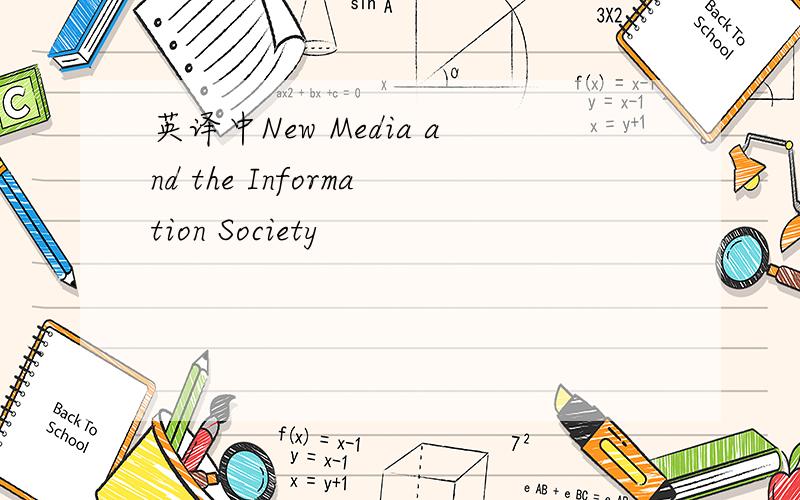英译中New Media and the Information Society
来源:学生作业帮 编辑:神马作文网作业帮 分类:英语作业 时间:2024/11/15 23:19:09
英译中New Media and the Information Society
However,as we shall see below,this is precisely the terrain that the recent
theoretical innovations of Manuel Castells have sought to capture.Whereas Schiller
is content to describe the progressive commodification of media cultures,Castells
more specifically focuses upon the interconnections between economy,politics and
culture within the information age.Manuel Castells (1996,1997,1998a) has come the closest of recent writers in
opening some of the important political features of contemporary media cultures.
Arguably,unlike the perspectives presented this far,Castells outlines a view of
contemporary media cultures that both deconstructs the polarities of the earlier
discussion while connecting them to processes of substantial social transformation.
Castells argues that the emergent ‘information society’ is primarily born out
of the changing relationship between global capitalism,the state and new social
movements.However he is equally clear that the development of new media,the
diversification of media messages,the implosion of politics and the media,and the
development of the politics of ‘scandal’ have all had far reaching effects upon
the public sphere.
Castells argues it is the development of the ‘informational economy’ that is
central to his attempt to rethink the dynamics of post-industrial society.In this
new economy it is the application of knowledge and technology in customised
production that best ensures economic success.The technological level of the
enterprise is a much better guide to its competitiveness than older indices like
labour costs (Castells,1989).The rapid development of informational technology
in the 1970s in Silicon Valley,USA enabled capital to restructure itself after the
impacts of a worldwide recession.‘Informationalism’ has allowed organisations
to achieve increased flexibility through more knowledge-dependent and less
hierarchical structures.New technology has enabled large structures to co-ordinate
their activities world wide,while building in reflexive inputs to both quickly
respond to the current state of the market and benefit from economies of scale
(Castells and Hall,1994).Hence whereas industrialism was oriented towards
economic growth,informationalism is more concerned with the development of
knowledge and the creation of networks.The digitalisation of knowledge bases
allows information to be processed and stored across huge distances.Thus
capitalism is becoming less dependent upon the state and more upon the ability of
a common informational system to transmit knowledge across distanciated networks
(Castells,1996).Within these processes old capitalism (the pursuit of profit)
and new capitalism (new information technology and new organizational forms)
converge.
However,as we shall see below,this is precisely the terrain that the recent
theoretical innovations of Manuel Castells have sought to capture.Whereas Schiller
is content to describe the progressive commodification of media cultures,Castells
more specifically focuses upon the interconnections between economy,politics and
culture within the information age.Manuel Castells (1996,1997,1998a) has come the closest of recent writers in
opening some of the important political features of contemporary media cultures.
Arguably,unlike the perspectives presented this far,Castells outlines a view of
contemporary media cultures that both deconstructs the polarities of the earlier
discussion while connecting them to processes of substantial social transformation.
Castells argues that the emergent ‘information society’ is primarily born out
of the changing relationship between global capitalism,the state and new social
movements.However he is equally clear that the development of new media,the
diversification of media messages,the implosion of politics and the media,and the
development of the politics of ‘scandal’ have all had far reaching effects upon
the public sphere.
Castells argues it is the development of the ‘informational economy’ that is
central to his attempt to rethink the dynamics of post-industrial society.In this
new economy it is the application of knowledge and technology in customised
production that best ensures economic success.The technological level of the
enterprise is a much better guide to its competitiveness than older indices like
labour costs (Castells,1989).The rapid development of informational technology
in the 1970s in Silicon Valley,USA enabled capital to restructure itself after the
impacts of a worldwide recession.‘Informationalism’ has allowed organisations
to achieve increased flexibility through more knowledge-dependent and less
hierarchical structures.New technology has enabled large structures to co-ordinate
their activities world wide,while building in reflexive inputs to both quickly
respond to the current state of the market and benefit from economies of scale
(Castells and Hall,1994).Hence whereas industrialism was oriented towards
economic growth,informationalism is more concerned with the development of
knowledge and the creation of networks.The digitalisation of knowledge bases
allows information to be processed and stored across huge distances.Thus
capitalism is becoming less dependent upon the state and more upon the ability of
a common informational system to transmit knowledge across distanciated networks
(Castells,1996).Within these processes old capitalism (the pursuit of profit)
and new capitalism (new information technology and new organizational forms)
converge.

英译中 新媒体和信息社会的
然而,正如我们下面将看到,这正是地形,最近的
曼纽尔翻译理论创新的有试图捕捉.而席勒
内容描述是进步的商品化的媒体文化、翻译吗
更具体地聚焦于经济、政治和间互连
在信息时代文化.曼纽尔》,1997,(1996年)到了1998a最为密切的最近的作家
开放的一些重要政治特性的当代媒体文化.
有争议的是,与视角概述了这么远的路,翻译问题的观点
现代传媒文化,既拆解极性较早
讨论而将它们连接到过程的众多社会转型.
认为《紧急的信息社会的主要是生出来
气候的变化关系、国家和全球资本主义社会新
动作.然而同样他也清楚地表明,新媒体的发展,
多元化的媒体信息,“内爆”政治和媒体以及
政治的发展”丑闻的都产生了深远的影响上
公众范围.
认为这是翻译的发展是经济”的信息
他试图重新思考的中心对后工业社会的动力学.在这个
新经济是知识的应用和技术为客户量身定制的
最好的保证产量进行了预测,经济上的成功.技术水平
企业是一个更好的指导其竞争力比旧的指标如
《劳动力成本(1989).信息技术的飞速发展
在20世纪70年代,美国矽谷使资本,要求它进行重组后的
一个世界性的经济衰退的影响.”信息主义 '已允许组织
通过增加灵活性达到更多的知识和依赖的更少
等级结构上.新技术使大型结构的协调
他们的活动在世界范围内建立过程中,对双方一触即发的输入很快
回应市场的当前状态,并从中受益的规模效应
(翻译和霍尔,1994年).因此而工业主义是面向
经济增长,信息主义更关注发展
网络的知识和创造.知识的取样频率基地
允许信息处理和储存在巨大的距离.因此
资本主义正变得越来越依赖于国家的能力和更多的在
一种常见的信息系统,在distanciated网络传播知识
(翻译,1996).在这些过程(旧资本主义追求利润)
和新资本主义(新的信息技术和新型组织形式)
收敛.
然而,正如我们下面将看到,这正是地形,最近的
曼纽尔翻译理论创新的有试图捕捉.而席勒
内容描述是进步的商品化的媒体文化、翻译吗
更具体地聚焦于经济、政治和间互连
在信息时代文化.曼纽尔》,1997,(1996年)到了1998a最为密切的最近的作家
开放的一些重要政治特性的当代媒体文化.
有争议的是,与视角概述了这么远的路,翻译问题的观点
现代传媒文化,既拆解极性较早
讨论而将它们连接到过程的众多社会转型.
认为《紧急的信息社会的主要是生出来
气候的变化关系、国家和全球资本主义社会新
动作.然而同样他也清楚地表明,新媒体的发展,
多元化的媒体信息,“内爆”政治和媒体以及
政治的发展”丑闻的都产生了深远的影响上
公众范围.
认为这是翻译的发展是经济”的信息
他试图重新思考的中心对后工业社会的动力学.在这个
新经济是知识的应用和技术为客户量身定制的
最好的保证产量进行了预测,经济上的成功.技术水平
企业是一个更好的指导其竞争力比旧的指标如
《劳动力成本(1989).信息技术的飞速发展
在20世纪70年代,美国矽谷使资本,要求它进行重组后的
一个世界性的经济衰退的影响.”信息主义 '已允许组织
通过增加灵活性达到更多的知识和依赖的更少
等级结构上.新技术使大型结构的协调
他们的活动在世界范围内建立过程中,对双方一触即发的输入很快
回应市场的当前状态,并从中受益的规模效应
(翻译和霍尔,1994年).因此而工业主义是面向
经济增长,信息主义更关注发展
网络的知识和创造.知识的取样频率基地
允许信息处理和储存在巨大的距离.因此
资本主义正变得越来越依赖于国家的能力和更多的在
一种常见的信息系统,在distanciated网络传播知识
(翻译,1996).在这些过程(旧资本主义追求利润)
和新资本主义(新的信息技术和新型组织形式)
收敛.
英译中New Media and the Information Society
英译中.New Media and the Information Society
莱斯特的New Media and Society主要是学什么的啊?
英语翻译WITH the ubiquity of new information technology and medi
英语翻译.Much of the electronic old and new media utilized by co
The media provides all kinds of information ranging from cur
The information society should be a people-centered,developm
the news media __radio,television and newspapers
英语翻译The job of the news media is to get information to the p
英语翻译1)英译中:The growth of electric media and the emphasis on l
THE OPEN SOCIETY AND ITS ENEMIES怎么样
英语演讲the society and i的提问